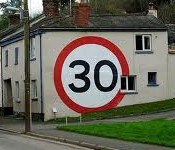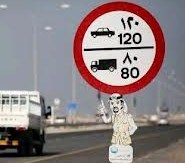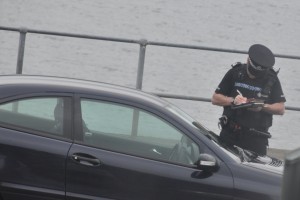


Paying Speeding and Parking Fines from Abroad
As more countries fall prey to the scourge of the speed camera, and local authorities realise that unsuspecting visitors are a great source of income, more and more travellers are incurring fines for minor traffic offences whilst driving abroad.
This is demonstrated by the large number of comments and questions at the foot of the page from 2014 . In fact, and please accept my apologies for this, I had to close the comment facility on the page. I was receiving literally hundreds of questions a day on a huge range of topics, and I’m not a lawyer, so was struggling to give accurate advice. Hopefully the detail below, gathered from a variety of sources will help you decide how to deal with your traffic related charge.
Alternatively, you could try the link below which will link you through an automated response service to a chat with a ‘live’ lawyer who can advise on your specific case (paid service) –
‘On the spot’ fines handed out by police officers are one problem (see my advice on dealing with the police abroad), but a fine received either by post or via your car rental company when you return home is becoming more common. The chances of your holiday transgression following you home depend largely on where the offence was committed, and the vehicle you were driving.
Traveller’s forums on the internet are awash with contradictory anecdotes on what happens if you incur a fine but don’t pay. The following advice is based on anecdotal evidence from a variety of sources and some personal contacts, rather than my own experience, and therefore should be treated as guidance rather than being accurate. The wide range of questions asked (see foot of page) shows the amount of confusion on this subject. I’m not a legal expert so can only guess at likely outcomes. My advice is to do your own research on sites such as this before making a decision on whether to pay a fine. All that is certain on this subject is that there are huge disparities between countries, and even states within countries on policy and this seems to be constantly changing.
My own recent experience tells me that it’s now very difficult to evade a speeding ticket as a foreign visitor. In France, driving my own vehicle, I received a ticket directly to my home with a week of the offence. The fine was 80 Euros which increased steeply if not paid within 28 days. Using the large South American company Localiza in Paraguay, my deposit was actually witheld for 2 weeks which is the period it would take for the company to receive any speeding or parking fines. Therefore, the authorities and rental companies have certainly grown more efficient in imposing fines on foreign visitors.
Also, this info covers minor traffic offences such as speeding fines or parking tickets. For more serious offences, certainly any involving death, injury or serious damage, its likely you would be pursued with the full weight of the law to the point of extradition.
Key points from many hours research –
• The approach to pursuing fines incurred by foreigners varies by country.
• If you were in a rental car, they will pass on your details to the authorities.
• The rental company may get hit with the charge and will be able to pass it onto you and potentially even charge your credit card. I’ve also now seen evidence that rental companies are applying a handling charge of up to $50 /40 Euros for any fines passed to them.
• Rental company terms /policy vary by company and country.
• I have seen no definite evidence that unpaid traffic offences are visible to immigration officials in any country. I have been unable to find any link between driving licence and passport so unless your passport details were recorded at the time of the offence, or by the rental company, its unlikely any country would have the capability or resource to link the two.
• Police officers may have visibility of outstanding fines previously incurred in their country, and most definitely will in their own specific state/region.
More detail per Region-
Europe
Some European countries seem to have an evangelistic hatred of speeding. For instance, Norway applies fine of up to 10% of annual income and possibly jail if the fine isn’t paid. Italian Cities are also notorious for complex disc systems in City Centres which tourists are unaware of, until they return home to a ticket.
The law is also catching up with European drivers who routinely evade fines incurred abroad. In 2011 the EU passed a bill stating that EU Member States will have to provide details of the driver or holder of the vehicle registration certificate to the authorities of the country where the offence took place. This will enable them to send the offender a registered letter informing him/her of the offence committed as well as any punishment due, appeal procedures and legal consequences. Any fine and payment method will be based on the law of the state where the offence occurred.
The law is backed by a body called Eucaris (European Car and Driving Licence Information System) which has been operational since 1994. The Eucaris system is used as an information sharing service, developed by and for the vehicle licencing authorities with the authorities acting as the point of contact in each country to streamline communications, instead of a mass of connections between different European registration authorities, police, customs etc. Therefore , any offence committed in an EU state will result in the owner of the vehicle receiving the fine, though obviously in many cases that will be the car rental company (see below).
USA
There are a whole load of urban myths surrounding unpaid traffic fines and entry to the USA, such as visitors being refused entry at immigration. Its difficult to separate absolute truth from fiction, and obviously the authorities won’t publicise their policy in case it causes people to evade payment.
However, my understanding is –
• For minor traffic offences, there is no link to the immigration process. It’s unlikely an officer who stops you for speeding will record your passport number and without this link to your licence, it would be impossible for US immigration to identify you as the non- fine payer. Rental companies often photocopy passports but in spite of persistent internet rumours, I’ve seen no definite evidence of a rental company providing passport details to the authorities which later impact a visitors future immigration status.
• The main chance of a prior offence coming back to haunt you is if you don’t pay a fine, then get stopped again in the same US State you committed the offence in. In that case, you will be likely to have to pay the fine in cash on the spot. If you fail to do so, a night in the County jail could well be on the cards…
• If stopped for another offence in a different state, it’s possible, but unlikely, that your previous offence may show up to the officer. Most states share data on offences with other states via the Driver License Compact (DLC), signed by 45 states plus the District of Columbia. (Georgia, Massachusetts, Michigan, Tennessee and Wisconsin are not DLC members. However, receiving a ticket in one of these states does not guarantee that it will not be reported to other states. ) The officer would have to carry out a national check of the full database to identify an offence committed in another state.
• As in Europe, if you don’t pay, the fine may well land with the car rental company who would then try and pass it on to you. If they fail to do so, you may find that you are blacklisted when you try to rent from them again. Again there are unqualified reports of rental companies sharing data with each other though I have yet to see this proved.
• Canadians committing offences in the USA and vice versa are more likely to be pulled up on re-entry using the same vehicle, especially in border states such as New York. Canada is particularly strict on serious traffic offences and may refuse you entry if you have serious convictions such as DUI.
• Also, the Driver License Agreement, combines the Driver License Compact and Non-Resident Violator Compact and includes Canada and Mexico meaning residents of those countries can be prosecuted and banned in their own nations for offences committed in USA.
Australia
As in USA, most States share information and pass on fines and charges. Therefore unpaid fines from Australian drivers incurred in other states will be passed on and will result in further action if unpaid. For unpaid fines issued to foreign drivers, a local decision will be taken on what further action to take. In many cases, this will be nothing, though I have heard of (unconfirmed) reports of a UK debt collection agency being engaged to recover an Australian fine.
When an offence is recorded, an infringement notice will be issued in the full name (as recorded on the drivers licence) and date of birth of the driver.This is later entered into the Police Central Names Index (CNI) and the National Names Index (NNI). Your main problem in future, if you fail to pay, is if you get stopped for another offence when back in Australia. If in the same State and the officer checks the CNI, then your name will appear. If you’re unlucky and in a different state, and he checks the NNI, then your details will appear with an outstanding fine which you will be likely to have to pay in cash on the spot.



Reciprocal Agreements
Some countries have reciprocal agreements where points and endorsements incurred abroad or in neighbouring states carry over to the home nation –
Australia The Australian States and Territories have all passed legislation regarding the recognition of demerit points and licence suspensions in other states/territories.
Canada Canadian Driver License Compact which is similar to the US Driver License Compact. Also The Driver License Agreement covers Mexico, Canada and Mexico and means that any offence committed in those countries can be prosecuted in the offender’s home nation.
European Union Information is shared as stated above but at present the EU is still developing conventions for the mutual recognition and enforcement of penalties for road traffic offences and driver disqualifications by the jurisdictions of member countries.
France France has an agreement with Switzerland for recognition of licence points and suspension and is working on agreements with other countries, especially the UK.
UK A single driver registration system applies to both England and Wales and Scotland; driving disqualifications and penalty points apply immediately in both jurisdictions. There is mutual recognition of driving disqualifications with Northern Ireland and the Republic of Ireland.
Mexico The Driver License Agreement covers Mexico, Canada and Mexico and means that any offence committed in those countries can be prosecuted in the offender’s home nation.
Northern Ireland The driver registration system of Northern Ireland has mutual recognition of driving disqualifications with the system in Great Britain and the Republic of Ireland.
Republic of Ireland The Republic of Ireland has mutual recognition of driving disqualifications with Great Britain and Northern Ireland.
USA Driver License Compact and Non-Resident Violator Compact cover out of state offences. The Driver License Agreement, a new compact combines the Driver License Compact and Non-Resident Violator Compact and includes Canada and Mexico.
Fines incurred in Rental Cars
How Rental companies deal with offences committed in their vehicles varies by company and country and is affected by that country’s law and whether they will end up being liable for the fine. In some countries, the driver of a vehicle is liable for ‘moving offences’ so the rental company can just pass on your details and not incur the fine themselves. However, it may be that the owner of the vehicle is liable for parking offences so they will always be landed with the fine. The rules vary by country –what is clear is that the company won’t want to be left holding the bill!
The policy per company and country should be stated somewhere in the terms and conditions when you make the reservation. (It may be hidden though- some companies only make their policy available on request)
This clause from Europcar is an example of the terms and conditions which cover this-
You must take care of the Vehicle, keep it in good repair and condition, pay any fines for which you may be liable, reimburse Europcar for any damage to the Vehicle, and refund Europcar for any costs it incurs. You are liable for all fees, taxes, fines and penalties incurred in connection with the use of the Vehicle and for which Europcar is charged, unless they have arisen through the fault of Europcar.
You will be liable for any offence committed during the rental period which relates in any way to your use of the Vehicle, as if you were the owner of the Vehicle. Upon the request of the Police or any official body Europcar may have to transfer your personal data. Such transfer will be done in accordance with the data protection Laws of the country of rental.
If you ignore a fine issued to you, and the authorities pass it on to the rental company, its unlikely they could charge your credit card after the event with the amount, unless their terms specifically state this. It’s more likely that they will continually harass you, until you pay, and if you don’t you will most certainly be blacklisted by that company. There are rumours of a shared blacklist amongst rental companies though I have seen no evidence of this. What is certain is that if the rental company incurs a charge and has to chase you, they will certainly impose an admin fee on top of the fine.
If you rented from a small company in the developing world, they too will try and pass on your details to the authorities. In many countries though, the police will lack the resources to chase payment beyond international boundaries and will simply fine the rental company. These rental companies will also probably bombard you with emails and phone calls chasing their money, but unless you intend to return to their country and use their services again, the ‘blacklist’ threat obviously has less impact. Bear in mind though that what may be a small amount to you could have a sizeable impact on a small rental company in the developing world. Better in my opinion to pay the fine than have that on your conscience.



Challenging Fines
Most countries have specific rules under which tickets can be issued, and most have a time limit which you may find has elapsed due to delays in responses from the rental company etc. It’s well worth a google search for details of the specific rules for the country you have received the fine from, to see if you can find any grounds to challenge it.
Also, you could try and make use of legislation. For example the EU has numerous rules around the rights of foreigners charged with offences abroad .Article 6 of the European Convention on Human Rights guarantees everyone who has been charged with a criminal offence the following minimum rights:
Everyone charged with a criminal offence has the following minimum rights:
(a) to be informed promptly, in a language which he understands and in detail, of the nature and cause of the accusation against him;
(b) to have adequate time and facilities for the preparation of his defence;
(c) to defend himself in person or through legal assistance of his own choosing or, if he has not sufficient means to pay for legal assistance, to be given it free when the interests of justice so require;
(d) to examine or have examined witnesses against him and to obtain the attendance and examination of witnesses on his behalf under the same conditions as witnesses against him;
(e) to have the free assistance of an interpreter if he cannot understand or speak the language used in court.
If you believe you’ve identified a loophole, you may want to try replying to the fine challenging on that point. For instance it could be argued that a speeding ticket, which reaches you 6 months after the offence and is written in a foreign language, breaches point A.
You could ask for details on how to apply for Legal aid, or how you contact the interpretor before you attend court.
Another tactic I’ve heard of is to contact the authority who issued the fine , say you wish to appeal against it and intend to appear in court. However, you want written confirmation that if you’re found not guilty, the court will cover your travel costs.
Obviously these are all stalling tactics, but will test the resolve of the authority to prosecute you. It could be that they have a policy of not pursuing, or waiving, any cases which look like it may end up taking up more resource, cost and time than the fine warrants.
What happens if you don’t pay?
That’s the million dollar question, to which there is no definite answer.
The likelihood of the non payment coming back to haunt you increases with each of the following factors –
• You were in a developed nation, especially one with reciprocal links to yours
• You were in a rental car from one of the big international companies
• The fine was significant
• You intend to revisit that country, especially the same State /area
• You intend to rent a car again from the same company
Some countries have a more stringent approach than others. I’ve heard a number of stories of New Zealand authorities employing debt collection agencies abroad to pursue fines for instance. I’ve also heard of some European countries ,especially in Scandinavia and Eastern Europe checking the licences of drivers in foreign registered cars crossing their borders for outstanding fines.
If you believe that none of the above factors apply, it’s probably safe to assume that the consequences of non payment will be no more than a few postal demands for the cash. (Bear in mind thought that if the fine is left with a small local company, it may inflict more damage on them than it would on you) .
You will also always have a nagging doubt hanging over you about future consequences if you had to return to that country. Therefore if the fine is for a manageable amount, my advice would be to pay the fine, and put the ticket on your notice board to remind you not to get caught breaking the law next time you drive abroad!.

81 comments